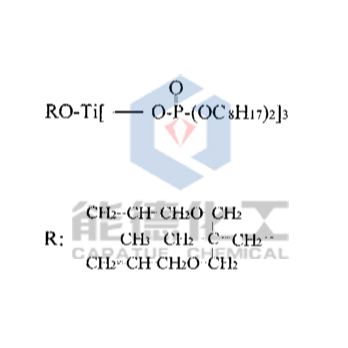

离岸价格
Get Latest Price|
1 Kilogram Minimum Order
国:
China
モデル番号:
TCA-L12
离岸价格:
ロケーション:
-
最低注文量の価格:
-
最低注文量:
1 Kilogram
パッケージの詳細:
-
納期:
-
供給能力:
-
支払いタイプ:
-
製品グループ :
-
連絡先担当者 Ms. Rose
20 Jiangjun avenue, Nanjing, Jiangsu
Abstract
Titanate Coupling Agent TCA-L*2 (CAS No. **********2) is a
neoalkoxy phosphate titanate coupling agent, it has a better
thermostability compared to traditional monoalkoxy titanates. Its
function is similar to Ken-React LICA *2 from Kenrich
Petrochemicals, Inc.
Identification
Name: Titanium IV 2, 2(bis *-propenolatomethyl)butanolato,
tris(dioctyl)phosphato-O
CAS Registry Number: **********2
Properties
Appearance: Yellow brow, transparent viscous liquid
Viscosity(*5. Cps): ***0
Flash Point (. TCC): **5
Density(*6): 1.*5
Solubility: Soluble in isopropyl alcohol, xylene and toluene.
Reacts with DOP and H2O.
Applications and Performance
Coupling Agents are molecular bridges at the interface between
two substrates, usually but not limited to an inorganic
filler/fiber and an organic polymer matrix. Titanium-derived
coupling agents react with free protons at the inorganic
interface resulting in the formation of organic-titanium
monomolecular layers on the inorganic surface. Additionally, the
coupling agent may have up to Six Functions in the matrix-which
include polymer catalysis and other heteroatom
effects-independent of inorganic content.
Typically, titanate-treated inorganics are hydrophobic,
organophilic, and organofunctional. Fillers may be pretreated or
treated in situ absent water of condensation and drying
techniques as needed with silanes. When used in polymers,
titanates can increase adhesion; Improve impact strength and
mechanical properties; Reduce embrittlement; Allow higher filler
loadings; Optimize particulate dispersion; Increase flow of
filled and unfilled polymers at lower process temperatures;
Prevent phase separation; And may have other effects.
Reactive Substrates
Proton reactivity allows coupling to almost all inorganic and
organic substrates such as CaCO3, carbonates, carbon black,
graphite, minerals, nano-particulates, silicas, silicates,
metals, metal oxides, peroxides, hydrates, acetates, borates,
sulfates, nitrates, nitramines, aramid, organic pigments,
cellulosics, sulfur, azodicarbonamide, polymers, etc.
Application and performance
TCA-L*2 can be used in composite materials to improve thermal
stability, surface smoothness and loading level of fillers to
reduce the dosage of resin and reduce the cost.
It can be applied to polymers including PP, PE and rubber.
TCA-L*2 is a surface treatment agent for inorganic fillers such
as calcium carbonate, kaoline, talcum etc, to improve hydrophobic
property and dispersion of the filler. As a result, the products
treated by this product will obtain improved mechanical strength,
reduced moisture absorption.
When rubber is filled by the filler of kaolin treated by TCA-L*2,
the rubber can obtain improved tearing strength and tensile
strength. So silica can be partly replaced.
| 国: | China |
| モデル番号: | TCA-L12 |
| 离岸价格: | Get Latest Price |
| ロケーション: | - |
| 最低注文量の価格: | - |
| 最低注文量: | 1 Kilogram |
| パッケージの詳細: | - |
| 納期: | - |
| 供給能力: | - |
| 支払いタイプ: | - |
| 製品グループ : | - |